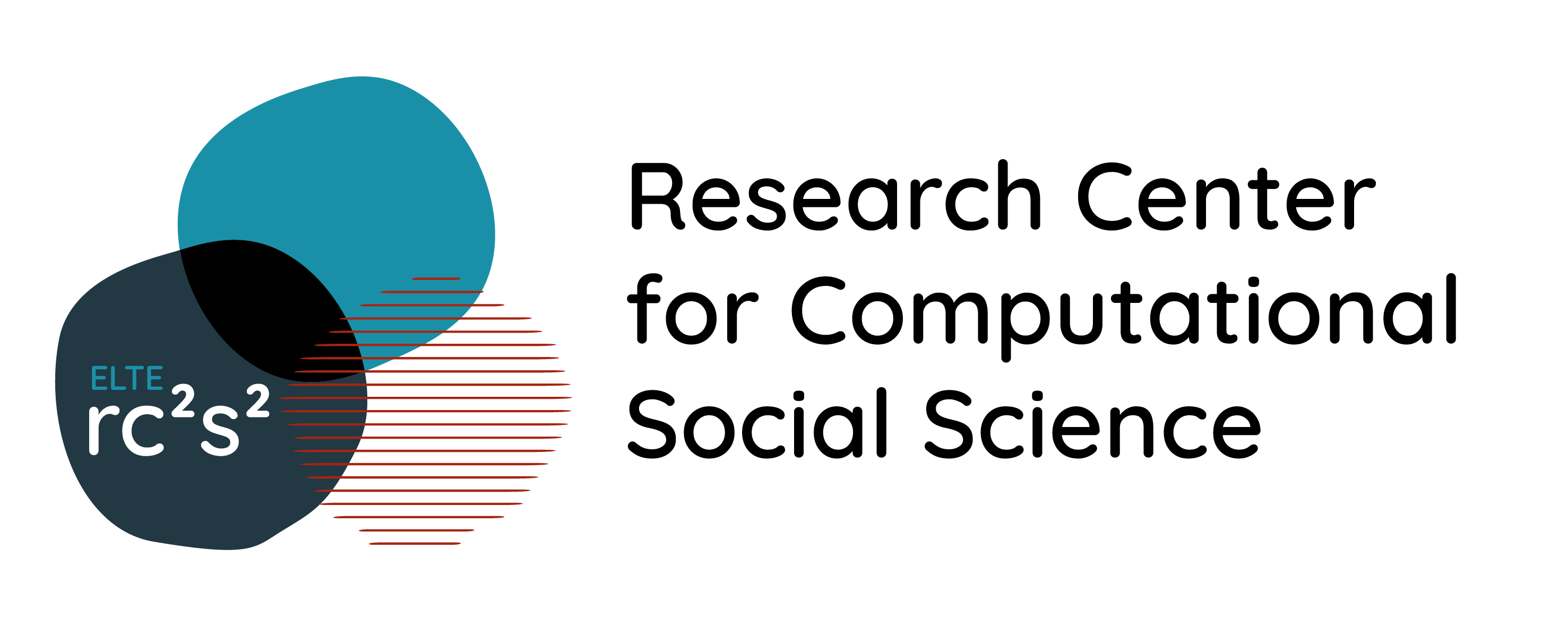Tímea Emese Tóth is a survey statistician. She is currently a PhD student at the Interdisciplinary Social Research Program at the Faculty of Social Sciences of ELTE, and she is also an assistant lecturer at the Methodology Department of Social Research from the academic year 2021/22. She conducted her thesis research in the framework of the research group under the supervision of Márton Rakovics. She tried to detect typical attitudes in the sustainability discourse on Twitter by sentiment analysis and topical modelling. The main research question of her dissertation tries to answer the question of what changes have taken place in sustainability communication at the levels of the Hungarian digital public sphere since the early 2000s, what trends are currently in place, and whether there is a flow of such communication between different areas. Her current supervisor is Dr. János Balázs Kocsis, Associate Professor at Corvinus University. She uses Natural Language Processing (NLP) as a methodological approach.
Doctoral Research
Title: Analysing sustainability in the triad of political publicity, online media platforms and the lay public
PhD student: Emese Tímea Tóth
Supervisor: Dr. János Balázs Kocsis
The main aim of the doctoral research is to assess, with the help of the method of computer text analytics, what changes have taken place in sustainability communication at the levels of the Hungarian digital spheres since the early 2000s, what trends are still in place, and whether there is a flow of information between the professional, lay, political and the journalistic spheres involved in the sustainability discourse, which can be clearly distinguished.
The turbulent period from 2001 to 2020 is not only significant in terms of events (entry into force of the Kyoto Protocol [2005], the National Climate Change Strategy [Act LX of 2007], the entry into force of the Paris Agreement [2006]), but also in terms of the importance of the online public sphere. The latter phenomenon gives us the opportunity to explore and understand the characteristics of spheres through automated processing of the constantly evolving text stream to a degree that was not previously possible (Rockstörm, Klum 2015; Raworth, 2017; Goulson, 2019; Dasgupta, McKenzie, 2020; IPCC, 2020; Németh, Katona, Kmetty, 2020; Németh, Koltai, 2021).
Examining the dynamics of online publicity through temporal comparisons can be done using dynamic and structural topical models and relevant NLP methods (e.g. sentiment analysis), resulting in more nuanced textual interpretability. The identification, implementation and validation of methods for analysing the transnational nature of online public sphere is also within the scope of this dissertation, together with the comparison of results with traditional survey methods (Tikk, 2007; Turney, Pantel, 2010; Blei et al, 2003; Mikolov et al, 2013; Alessia et al, 2015; Hutto, Gilbert, 2015; Sankar-Subramaniyaswamy, 2017)
References
Alessia, D., Ferri F., Grifoni, P., Guzzo, T. (2015). “Approaches, tools and applications for sentiment analysis implementation.” International Journal of Computer Applications, vol. 125, no. 3, pp. 26-33, September. Accessed 2020-08-18.
Blei, D. M., Ng, A. Y., & Jordan, M. I. (2003). Latent Dirichlet Allocation. Journal of Machine Learning Research, 3:993-1022
Hutto, C.J., Gilbert, Eric. (2015). VADER: A Parsimonious Rule-based Model for Sentiment Analysis of Social Media Text. Proceedings of the 8th International Conference on Weblogs and Social Media, ICWSM 2014.
Intergovernmental Panel on Climate Change – The IPCC and the Sixth Assessment Cycle, (2020). https://www.ipcc.ch/site/assets/uploads/2020/05/2020-AC6_en.pdf [letöltve: 2021.03.06.]
Mikolov, T., Chen, K., Corrado, G. & Dean, J. (2013). Efficient estimation of word representations in vector space. arXiv preprint, arXiv:1301.3781.
Németh, R., Katona, E. R., Kmetty, Z. (2020) Az automatizált szövegelemzés perspektívája a társadalomtudományokban. SZOCIOLÓGIAI SZEMLE, 30 (1). pp. 44-62. ISSN 1216-2051
Németh, R., Koltai, J. (2021) The Potential of Automated Text Analytics in Social Knowledge Building. In: Rudas T., Péli G. (eds) Pathways Between Social Science and Computational Social Science. Computational Social Sciences. Springer, Cham. https://doi.org/10.1007/978-3-030-54936-7_3
Raworth, K. (2017). Doughnut economics: seven ways to think like a 21st-century economist. London: Random House.
Rockström, J. & Klum, M. (2015). Big world, small planet: Abundance within planetary boundaries.
Sankar, H., Subramaniyaswamy, V. (2017). “Investigating sentiment analysis using machine learning approach,” 2017 International Conference on Intelligent Sustainable Systems (ICISS), Palladam, India, 2017, pp. 87-92, doi: 10.1109/ISS1.2017.8389293.
Tikk, D., Farkas R., Kardkovács, Z. T., Kovács L., Répási, T., Szarvas, G., Szaszkó, S., Vázsonyi, M. (2007) Szövegbányászat. Typotex, Budapest, 2007.
Turney, P. D., Pantel, P. (2010). From frequency to meaning: Vector Space Models of semantics. journal of Artificial Intelligence Research, 37, 141–188.
Turney, P. D., Pantel, P. (2010). From frequency to meaning: Vector Space Models of semantics. journal of Artificial Intelligence Research, 37, 141–188.
ÚNKP Research 2021/22
Title: How has the COVID-19 pandemic redefined the concept of sustainability in the lay public? Narratives and communication strategies.
PhD student: Emese Tímea Tóth
Supervisor: Dr. János Balázs Kocsis
The UNKP research aims to analyse lay public narratives that explicitly link the COVID-19 pandemic to the issue of sustainability.
The two phenomena (pandemic and sustainability) can be linked at several points. First of all, the pandemic situation, according to many authors, is self-inflicted by humanity through the pursuit of activities where infectious microorganisms are able to spread from animal to human. (IBPES 2020; SETTELE ET AL. 2020)
In addition, several studies highlight that the epidemic has stimulated people to adopt mindsets and operational mechanisms that are aligned with the goals of sustainable development and that focus attention on, for example, climate change and increased awareness of its signs. (GALVANI, LEW, PEREZ, 2020; HORTAY, STEFKOVICS, 2021) The key to avoiding similar situations in the future would be, among others (BIGLIERI, VIDOVICH, KEIL, 2020; CONNOLL, ALI, KEIL, 2020; ACUTO ET AL, 2020; DASGUPTA, MCKENZIE, 2020; SOLOW, 1974, STEFFEN ET AL., 2015; DREWS, ANTAL, 2016; DREWS, REESE, 2018), if, first and foremost, a transformation towards sustainability is achieved in social, economic, technological and spatial terms, while at the same time challenging paradigms that make infinite unsustainable growth and profit-making the primary goal.
Finally, Raworth argues that a focus on health, an adequate income-labour ratio, peace and justice, social and gender equality and education are all aspects that should be given priority (RAWORTH, 2017), and ideally converge in the hands of political leaders, making sustainability a relevant public policy issue. Without knowledge of society, without knowledge of the opinions and positions of the individuals who make it up, no legitimate professional and political decisions can be made, says the primary guide to sustainability, David Attenborough. This is confirmed by the authors Bodenheimer and Leidenberger, who add that coordinated action based on appropriate policy choices is best achieved through conscious planning and carefully designed strategic communication to the public. (ATTENBOROUGH, HUGHES, 2020; BODENHEIMER, LEIDENBERGER, 2020)
The aim of our research is to examine the public representation of these discourses. After creating a corpus in Hungarian defined by a keyword search, we analyse texts generated by the lay public on social media platforms, blogs, online newspapers, comment sections of magazines. We focus on digital public manifestations that deal with both phenomena (pandemics and sustainability). The analysis is performed using topical modelling, which assumes that there are words with strong semantic information and that documents dealing with a similar topic use similar groups of words. (BLEI ET AL, 2003) The method can also be used to understand the society represented in the online space and the set of narratives they represent, which can provide a basis for designing the strategic communication to the public mentioned earlier.
References
Acuto, M., Larcom, S., Keil, R. et al. (2020) Seeing COVID-19 through an urban lens. Nat Sustain 3, 977–978. https://doi.org/10.1038/s41893-020-00620-3
Biglieri, S., Vidovich, L.D., Keil, R. (2020) City as the core of contagion? Repositioning COVID-19 at the social and spatial periphery of urban society, Cities & Health, DOI: 10.1080/23748834.2020.1788320
Bodenheimer, M., Leidenberger, J. (2020) COVID-19 as a window of opportunity for sustainability transitions? Narratives and communication strategies beyond the pandemic, Sustainability: Science, Practice and Policy, 16:1, 61-66, DOI: 10.1080/15487733.2020.1766318
Blei, D. M., Ng, A. Y., Jordan, M. I. (2003). Latent Dirichlet Allocation. Journal of Machine Learning Research, 3:993-1022
Connolly, C., Ali, S. H., & Keil, R. (2020). On the relationships between COVID-19 and extended urbanization. Dialogues in Human Geography, 10(2), 213–216. https://doi.org/10.1177/2043820620934209
Dasgupta, P., McKenzie, E. (2020). The Dasgupta Review – Independent Review on the Economics of Biodiversity Interim Report https://assets.publishing.service.gov.uk/government/uploads/system/uploads/attachment_data/file/882222/The_Economics_of_Biodiversity_The_Dasgupta_Review_Interim_Report.pdf
Drews, S., Miklós A. (2016). „Degrowth: A “Missile Word” That Backfires?” Ecological Economics 126:182–87. doi: 10.1016/j.ecolecon.2016.04.001.
Drews, S., Reese, G. (2018). „“Degrowth” vs. Other Types of Growth: Labeling Affects Emotions but Not Attitudes”. Environmental Communication 12(6):763–72. doi: 10.1080/17524032.2018.1472127.
Galvani, A., Lew A.A. , Perez, M.S. (2020) COVID-19 is expanding global consciousness and the sustainability of travel and tourism, Tourism Geographies, 22:3, 567-576, DOI: 10.1080/14616688.2020.1760924
Hortay, O., Stefkovics, Á. (2021). Fear of COVID-19 Reinforces Climate Change Beliefs. Evidence From 28 European Countries. 10.21203/rs.3.rs-366967/v1.
IBPES – The global assessment report on biodiversity and ecosystem services – Summary for policymakers, (2019). https://ipbes.net/sites/default/files/2020-02/ipbes_global_assessment_report_summary_for_policymakers_en.pdf [letöltve: 2021.03.29.]
Settele, J., Díaz, S., Brondizio, E. (2020). COVID-19 Stimulus Measures. Must Save Lives, Protect Lovelihoods, and Safeguard. Nature to Reduce the Risk of Future Pandemics. IBPES Expert Guest Article
Solow, R. M. (1974). „The Economics of Resources or the Resources of Economics”. The American Economic Review 64(2):1–14. doi: 10.2307/1816009.
Steffen, W., Richardson, K., Rockström, J., Cornell, S., Fetzer, I., Bennett, E., Biggs, R., Carpenter, S., Vries, W., de Wit, C., Folke, C., Gerten, D., Heinke, J., Persson, L., Ramanathan, V., Reyers, B., Sörlin, S. (2015). ‘Planetary Boundaries: Guiding Human Development on a Changing Planet’. Science. doi: 10.1126/science.1259855.
ÚNKP Research 2022/23
Title: Narrative possibilities framed by political polarisation – sustainability in online media platforms
PhD Student: Tímea Emese Tóth
Supervisor: Renáta Németh, PhD.
The role of the internet in informing people about public policy issues has increased in recent years, with more than half of those who inform themselves regularly obtaining information from the internet (Hann et al., 2020), suggesting that internet-based political communication clearly plays a prominent role. Knap, Bartha and Barna report on the transformation of the Hungarian media landscape in their study 2021, citing the establishment of the National Media and Infocommunications Authority and the Media Council in 2010, the foundation and centralisation of public service media (Bajomi-Lázár 2013: 81-82; cited in Knap-Bartha-Barna, 2021), and the freeisation of MTI, which resulted in the loss of economic autonomy of the media market and the politicisation and polarisation of the entire media market (Polyák, 2019; cited in Knap-Bartha-Barna 2021).
As a result of the centralisation observed in the case of government-side media, it can be said that public service media and pro-government organs belonging to the KESMA convey government-side narratives so closely, framing the issues they consider important in a way that, when examined, reveals the articulation of political communication represented by the media market along the pro-government/non-pro-government axis (Knap-Bartha-Barna, 2021).
Similar politicisation and polarisation tendencies can be observed in the ecological and sustainability field, where the discursive political narrative is key. According to András Lányi, the real question is not whether our descendants will live a different life from ours, but what it will be like, which depends on the decisions we make today, as he puts it. (Lányi, 2020:7)
The intertwined political narratives that move people to action mostly find an audience on online media platforms, which directly points to the importance of research.
Therefore, the aim of this research is to investigate how and to what extent different political sites and groups include sustainability in their political discourse, what differences and what identifications can be found in these narratives. The specificity of the research and the interest of the results to be produced is the comparison with the political segmentation of ecology as an environmentalist, ‘green’ worldview.
References
Acuto, M., Larcom, S., Keil, R., Ghojeh, M., Lindsay, T., Camponeschi, C., Parnell, S. (2020). Seeing COVID-19 through an urban lens. Nature Sustainability, 3(12), 977–978. https://doi.org/10.1038/s41893-020-00620-3
Arora, N. K., Mishra, J. (2020). COVID-19 and importance of environmental sustainability. Environmental Sustainability, 3(2), 117–119. https://doi.org/10.1007/s42398-020-00107-z
Bajomi-Lázár, P. (2017): Particularistic and Universalistic Media Policies: Inequalities in the Media in Hungary. Javnost – The Public, 162–72. https://doi.org/10.1080/13183222.2017.1288781
Blei, D. M., Ng, A. Y., & Jordan, M. I. (2003). Latent Dirichlet Allocation. Journal of Machine Learning Research, 3:993-1022
Dodds, K., Broto, V. C., Detterbeck, K., Jones, M., Mamadouh, V., Ramutsindela, M., Varsanyi, M., Wachsmuth, D., & Woon, C. Y. (2020). The COVID-19 pandemic: territorial, political and governance dimensions of the crisis. Territory, Politics, Governance, 8(3), 289–298. https://doi.org/10.1080/21622671.2020.1771022
Hann, E. – Polyák, G. – Megyeri, K. – Urbán, Á. (2020): Megfertőzött médiarendszer: A politikai tájékozódás forrásai Magyarországon 2020. Budapest: Friedrich-Ebert-Stiftung. https://budapest.fes.de/fileadmin/user_upload/dokumente/pdf-dateien/Mertek_ hirfogyasztasi_szokasok.pdf
Knap, Á., Bartha, D., Barna, I. (2021): Trianon és a holokauszt emlékezetpolitikai jellegzetességeinek elemzése a természetesnyelv-feldolgozás használatával. Budapest. Szociológiai Szemle, 31 (4). pp. 28-62. ISSN 1216-2051
Lányi A., (2016): Az ökológia mint politikai filozófia. In: Elképzelt közösségeim. Budapest, Scholar. 183-216.
Lányi, A., (2020) Bevezetés az ökofilozófiába. Kezdő haladóknak. Budapest, L’Harmattan Kiadó – Könyvpont Kiadó.
Luhmann, N.: (2006) A nyílt rendszerek elmélete, In: Bevezetés a rendszerelméletbe. Budapest, Gondolat, 2006. p43-64
McCright, A. M., Dunlap, R. E. (2011). The politicization of climate change and polarization in the American public’s views of global warming, 2001–2010. The Sociological Quarterly, 52(2), 155–194. https://doi.org/10.1111/j.1533-8525.2011.01198.x
Nagy K., (2020) Ökopolitika és baloldali hagyomány. Az ökológiai probléma eszmetörténete a későmodern baloldali gondolatban. Szakdolgozat. ELTE – TÁTK., 2020.
Polyák, G. (2019): Media in Hungary: Three Pillars of an Illiberal Democracy. In Połońska, E. – Beckett, C. (szerk.) Public Service Broadcasting and Media Systems in Troubled European Democracies. Cham: Palgrave Macmillan, 279–303.


 Google Scholar
Google Scholar  LinkedIn
LinkedIn  MTMT
MTMT  ORCID
ORCID